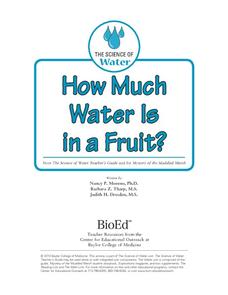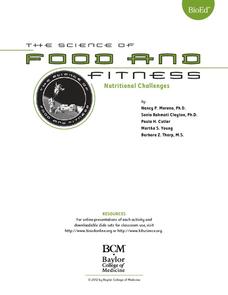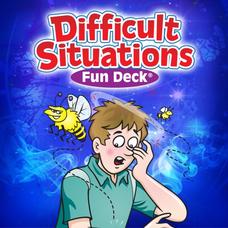Baylor College
How Much Water Do Humans Need?
Physical or life science learners measure the amounts of water eliminated by intestines and the urinary system, and the amounts lost via respiration and perspiration. In doing so, they discover that the body's water must be replenished...
Baylor College
How Much Water Is in a Fruit?
Compare the volume of an orange to the volume of liquid that can be extracted out of it. Also compare the mass of an apple before and after it has been dried out. In both of these activities, children find that there is an appreciable...
Baylor College
Heart Rate and Exercise
Teach your exercise enthusiasts to read their pulse rate at the radial artery and multiply by four to calculate beats per minute. Learners perform a variety of activities, recording their heart rates after one minute of each. Though...
BioEd Online
Nutritional Challenges
Eating healthy can be a challenge, especially for people with special dietary needs. After learning about standard nutritional needs for adults, learners take on the role of a dietician and work together to create a menu for one of the...
BioEd Online
Serving Sizes
When it comes to eating a balanced diet, portion control is paramount, but what is the difference between the serving size on the nutrition facts label and a portion as determined by the USDA? In a comprehensive look at portion control,...
Baylor College
Body Mass Index (BMI)
How do you calculate your Body Mass Index, and why is this information a valuable indicator of health? Class members discover not only what BMI is and practice calculating it using the height and weight of six fictitious individuals, but...
BioEd Online
Muscles and Bones: Nutrition
Got milk? Or almonds, sardines, or tofu? Calcium is important throughout life, but especially so for developing bodies. If teens do not consume enough calcium while they are growing, they are at a much higher risk of osteoporosis and...
Baylor College
Food for the Brain
With a couple of neat diagrams on student handouts, your life science or health class will examine the contents and serving sizes of healthy foods. They dissect a slice of pizza and scrutinize the nutritional value of its components in...
Stew Leonard's
Stewie the Duck Learns to Swim
Make a splash with an interactive storybook that emphasizes water safety. Directed at preschoolers and primaries, the ducky tale and games reinforce the rules of wearing a life vest whenever near water, making sure to have a supervising...
Baylor College
Hormones and Stress
As a more personal part of a unit on brain chemistry, your class discusses stressful situations and the body's response to them. They talk about how, while the reactions are initially helpful, some can be harmful to your health. Finally,...
Champions for Change
How Many Cups Do I Need?
Does an apple a day really keep the doctor away? Find out by browsing through a variety of handouts and learning the recommended daily amounts of fruits and vegetables for good health. Learners will read and discuss how to visually...
MD Anderson Cancer Center
Tobacco Free Teens
Clear the smoke about cigarette use with an engaging application. Comic strip animation and games teach learners why they should never try smoking in the first place, and how to quit this lethal habit if they have already been lured in.
Baylor College
Water in Your Body
Do you know how much water you have had in the last 24 hours? Do you know how much your body needs? In this hands-on activity, your class members will estimate how much water our bodies lose each day by filling and emptying one-liter...
Purdue University
Healthy Body Image: Healthy Exercises for Every Body
From three-way neck rolls to a figure-5 hurdler's stretch, this is an ultimate guide to healthy exercises. It begins with a bulleted list of general guidelines on cardiorespiratory exercise, flexibility, resistance exercises, and range...
Westford Academy
Goals: Getting There
This is a general goal-setting activity that asks learners to set a specific goal, consider what roadblocks they might encounter, and then outline steps toward overcoming those roadblocks and ultimately achieving their goals. This can be...
Southern Nevada Health District
What Am I ?
Have fun learning about fruits and vegetables with a game of pictionary! One team draws a fruit or vegetable on the board, while the other team collaborates to guess what it is. After the game, class members discuss where foods are grown...
Curated OER
Human Body Series - The Digestive System Quiz (Grades 6 to 8)
Get those gastric juices going with a delicious quiz on the digestive system! Middle school learners fill in the blanks about the process of digestion, the function of different organs and fluids, and problems that can occur with the...
Nemours KidsHealth
Human Body Series: Immune System
When you work with school children, teaching about immunity and illness prevention is a priority! This approach includes a discussion, kid-friendly online articles, a creative writing assignment, and a quiz on the role of leukocytes and...
Super Duper Publications
Difficult Situations Fun Deck
What would you do? Fifty-six illustrated picture flash cards provide players with an opportunity to talk about difficult situations, practice responses to awkward or uncomfortable situations, and consider how to deal with dangerous...
Curated OER
Human Body Series - Respiratory System
Elementary schoolers play a respiratory relay toss in order to take in the respiratory system! They also create their own question cards based on several kid-friendly online articles about breathing and the health of the lungs. They use...
Odyssey of the Mind
Odyssey of the Mind Curriculum Activity: HEALTHY HUMOR
This lesson is hilarious! To understand how to investigate a topic, collect data, and evaluate the results, learners research the effects of laughter on health. Each group is assigned a research task, which they will turn into...
Perkins School for the Blind
Safety Skills
Learning how to stay safe in a dangerous situation is of utmost importance, especially when you have a visual impairment or special need. The teacher makes up a set of dangerous scenario cards based on the provided set of guiding...
PBS
U.S. Agricultural Subsidies and Nutrition
Most young people don't spend a lot of time thinking about why some foods cost less than others. This resource uses clips from the documentary, Food, Inc. to explore the impact of agricultural subsidies on nutrition, health, and the...
Curated OER
Who is the Expert? Exploring Credible Sources in Healthcare
How do you decide what sources are credible when researching online? Evaluate sources with a focus on researching health issues. After brainstorming common health concerns and how they would try to diagnose these problems, class members...

























